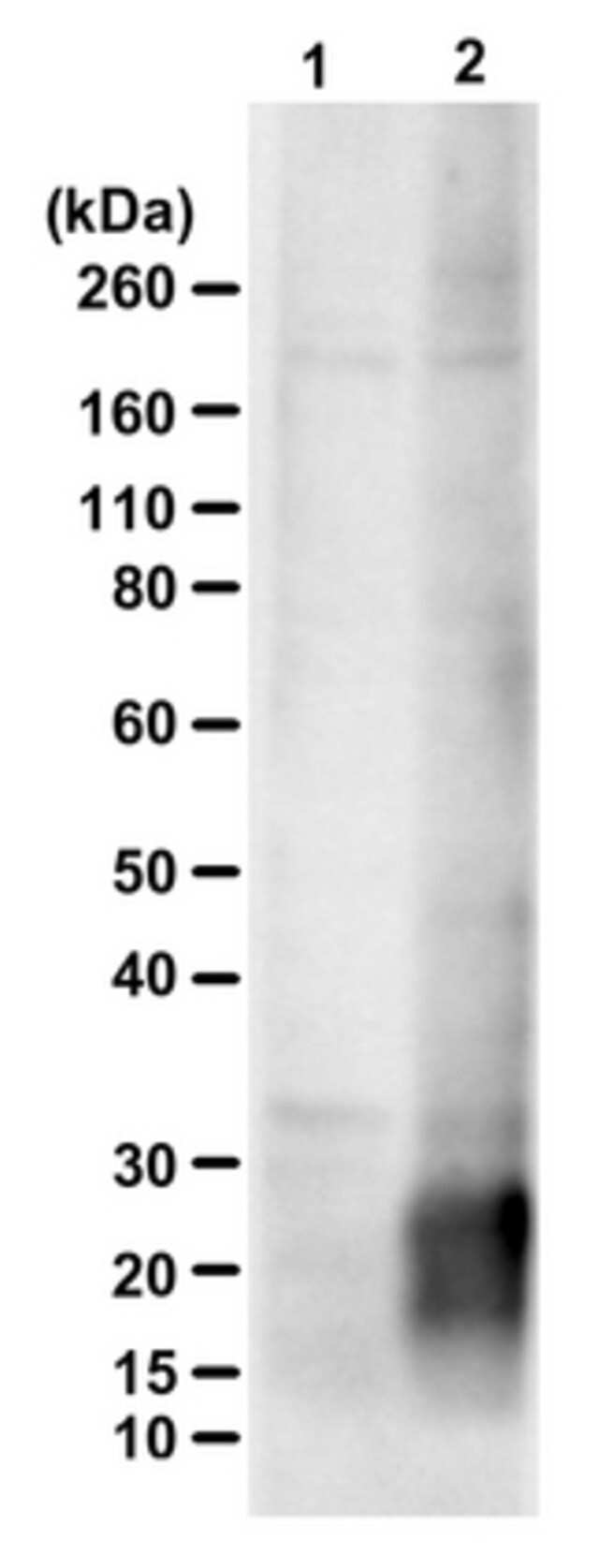您的位置:首页 > 产品中心 > Anti-poly-(LPAC)
Anti-poly-(LPAC)

产品别名
Anti-poly-(LPAC)
(Leu-Pro-Ala-Cys)Exp
基本信息
| eCl@ss | 32160702 |
| General description【一般描述】 | RAN, a small GTP binding protein, belonging to the RAS superfamily is involved in the translocation of RNA and proteins through the nuclear pore complex and participate in the control of DNA synthesis and cell cycle progression. LPAC (Leu-Pro-Ala-Cys) RAN proteins that are primarily localized to cytoplasmic region are reported to accumulate in the gray matter region of the brain of subjects with myotonic dystrophy type 2 (DM2). LPAC cytoplasmic aggregates are found in neurons, astrocyte, and glia. LPAC proteins are shown to be toxic to cells independent of RNA effects and are found in regions of the brain that display pathologic changes. Studies have shown that tetranucleotide DM2 CCTG expansion mutation is bidirectionally transcribed and the resulting RNAs are RAN translated and produce tetrapeptide expansion proteins with LPAC from the sense strand and that these proteins accumulate in DM2 patient brains. (Ref.: Zu, T., et al. (2017). Neuron 95 (8); 1292-1305). |
| Specificity【特异性】 | This rabbit polyclonal antibody specifically detects proteins with poly-(LPAC). |
| Immunogen【免疫原】 | A synthetic peptide corresponding to the (LPAC)EXP repeat motif. Epitope: unknown |
| Application【应用】 | Research Category Neuroscience Anti-poly-(LPAC), Cat. No. ABN2258, is a highly specific rabbit polyclonal antibody that targets poly-(LPAC) and has been tested for use in Immunohistochemistry, Immunofluorescence, and Western Blotting. Western Blotting Analysis (WB): 1:1000 of this antibody detected poly-(LPAC) HEK293T-poly-(LPAC) cells, but not in control cells.. Western Blotting Analysis: A representative lot detected poly-(LPAC) in Western Blotting applications (Banez-Coronel, M., et. al. (2015). Neuron. 88(4):667-77). Immunofluorescence Analysis: A representative lot detected poly-(LPAC) in Immunofluorescence applications (Banez-Coronel, M., et. al. (2015). Neuron. 88(4):667-77). Immunohistochemistry Analysis: A representative lot detected poly-(LPAC) in Immunohistochemistry applications (Banez-Coronel, M., et. al. (2015). Neuron. 88(4):667-77). |
| Quality【质量】 | Evaluated by Western Blotting in HEK293T cells transfected with poly-(LPAC). Western Blotting Analysis (WB): A 1:1,000 dilution of this antibody detected poly-(LPAC) in HEK293T cells transfected with poly-(LPAC), but not in control cells. |
| Physical form【外形】 | Unpurified Rabbit polyclonal antiserum with 0.05% sodium azide. |
| Other Notes【其他说明】 | Concentration: Please refer to lot specific datasheet. |
产品性质
| biological source【生物来源】 | rabbit |
| antibody form【抗体形式】 | serum |
| antibody product type | primary antibodies |
| clone【克隆】 | polyclonal |
| species reactivity | human |
| packaging【包装】 | antibody small pack of 25 μL |
| technique(s) | immunofluorescence: suitable immunohistochemistry: suitable western blot: suitable |
| isotype【同位素/亚型】 | IgG |
产品说明
| Target description【目标描述】 | ~25 kDa observed. Uncharacterized bands may be observed in some lysate(s). |
| Storage and Stability【储存及稳定性】 | Stable for 1 year at -20°C from date of receipt. Handling Recommendations: Upon receipt and prior to removing the cap, centrifuge the vial and gently mix the solution. Aliquot into microcentrifuge tubes and store at -20°C. Avoid repeated freeze/thaw cycles, which may damage IgG and affect product performance. |
| Disclaimer【免责声明】 | Unless otherwise stated in our catalog or other company documentation accompanying the product(s), our products are intended for research use only and are not to be used for any other purpose, which includes but is not limited to, unauthorized commercial uses, in vitro diagnostic uses, ex vivo or in vivo therapeutic uses or any type of consumption or application to humans or animals. |
安全信息
| Storage Class Code【储存分类代码】 | 12 - Non Combustible Liquids |
| WGK | WGK 1 |




